Algarve-South-Portugal.com
The best independent guide to the Algarve
Algarve-South-Portugal.com
The best independent guide to the Algarve
Olhão, Portugal; an independent tourism guide for 2026
In a region often defined by polished resorts, Olhão offers a powerful dose of unvarnished Portuguese life. This is a hardworking fishing port, a town whose identity is forged not by tourism, but by its deep connection to the sea and the relentless rhythm of its bustling harbour. Its authenticity is its appeal, offering a glimpse into an Algarve that exists beyond the holiday brochures.
The town's character is immediately apparent. At its waterfront stand the iconic, red-brick markets, home to the largest and most vibrant fish market in the Algarve. From here, the Bairro dos Pescadores (fishermen's quarter) unfolds into a labyrinth of narrow, whitewashed alleys, where the unique, flat-roofed 'cubist' houses reveal a hint of North African architectural heritage.
This gritty, urban energy exists in stunning contrast to the pristine natural world on its doorstep. Olhão opens directly onto the tranquil lagoons and protected waterways of the Parque Natural da Ria Formosa, a haven for birdlife that can be explored by boat or kayak. Just a short ferry ride across these calm waters lie the sandbar islands of Ilha da Armona and Ilha da Culatra, offering kilometres of unspoilt golden sands - a world away from the crowded beaches elsewhere.
Olhão may lack conventional tourist polish, but it rewards visitors with something far more genuine. This guide will provide everything you need to discover the treasures of Olhão, helping you plan the perfect visit to one of the Algarve’s most characterful and authentic destinations.
Highlights of Olhão
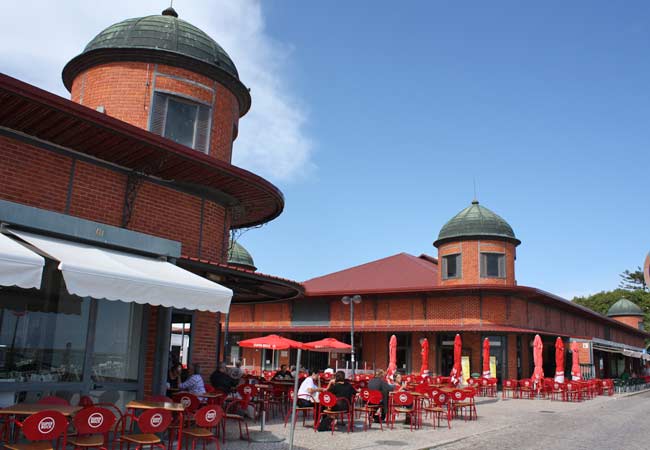
The Mercados de Olhão - The daily fish and fresh produce market housed in the neo-Arabic styled covered market.
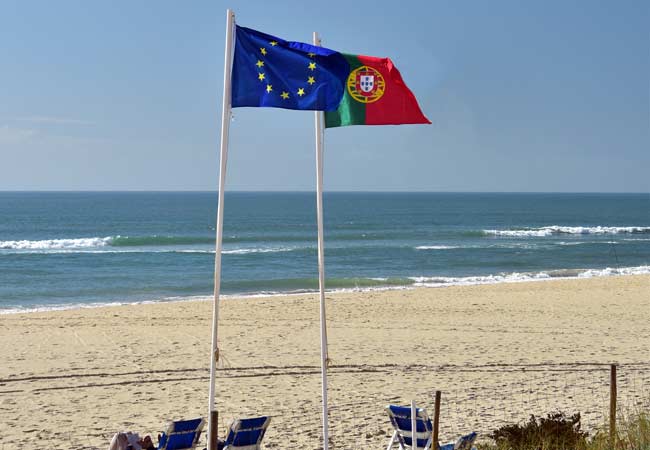
The Ilha da Armona – The sandbar island south of Olhão, which provides pristine sandy beaches and kilometres of deserted coastline. The island is reached by ferry from Olhão harbour.
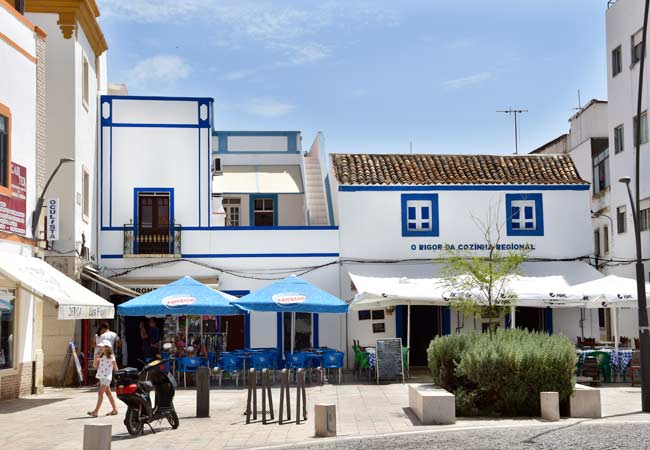
The Bairro dos Pescadores - The traditional fishermen district of Olhão, with its unique cubic house and authentic Portuguese atmosphere.
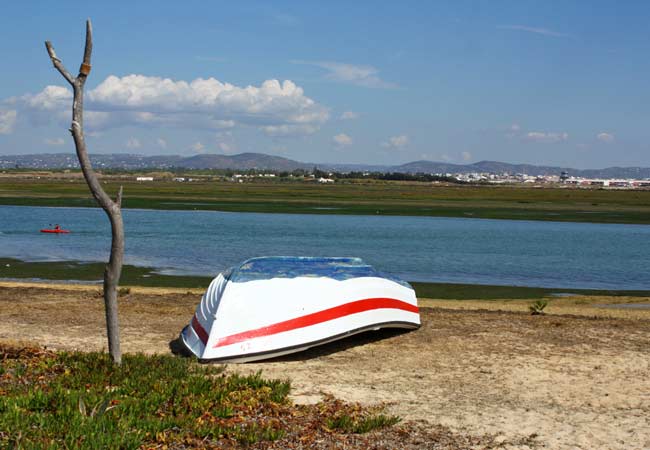
The Parque Natural da Ria Formosa – The saltwater lagoons and protected waterways with extensive bird and marine life. The area can be explored by boat tour, kayak or the nature trails that lead from Olhão.
Olhão for a day trip
Olhão makes for an enjoyable destination for a day trip. The town has a range of unique tourist attractions, and the atmosphere of Olhão is very different from the major resort towns in the Algarve.
The main sights of Olhão can be seen within two hours of sightseeing, and the day could be extended by visiting the beaches on the Ilha da Armona or the fishing community on the Ilha da Culatra.
Another option is to explore the Parque Natural da Ria Formosa. There are boat tours that depart from Olhão harbour, or there are pleasant hiking trails around the Quinta de Marim, where the visitor centre is situated.
For your day trip, it is very easy to travel to Olhão as it is served by the Algarve regional railway.
Below is an interactive map for a suggested day trip to Olhão. The green route is a suggested tour of Olhão town, while the yellow route is a 3km trail around the Quinta de Marim. (Note: zoom out to see all of the points)
Sights: 1) Avenida da República 2) Nossa Senhora do Rosário church 3) Nosso Senhor dos Aflitos chapel 4) Museum of Olhão 5) Olhão town hall 6) Praça Patrão Joaquim Lopes 7) Mercado de Olhão 8) Jardim Pescador Olhanense 9) Bom Sucesso boat 10) ferries to Armona and Culatra 11) Olhão fishing harbour 12) Fishing murals 13) Fishermen’s district 14) Quinta de Marim 15) Tidal mill museum
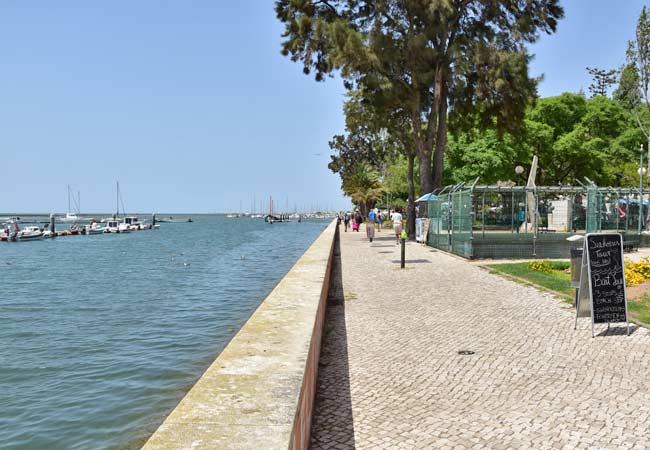
The Jardim Pescador Olhanense and Olhão waterfront
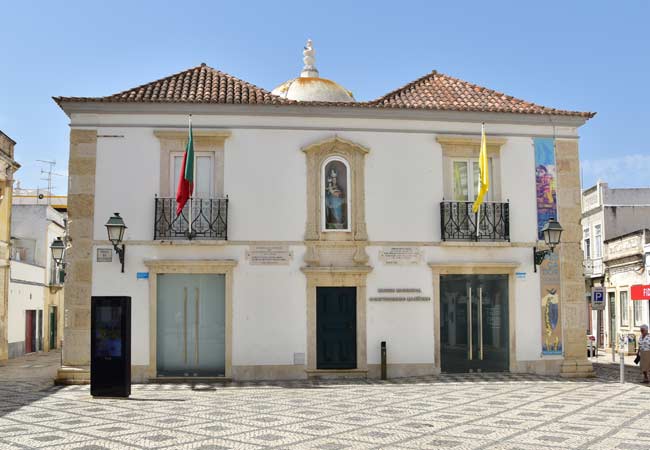
The small Museu Municipal de Olhão details the history of the town
A holiday to Olhão
Olhão is not a conventional holiday destination, such as Albufeira, Lagos or Vilamoura. Olhão is a fishing town, with a charming historic centre but equally some very bland and dilapidated areas. The other aspect about Olhão is that there are no beaches within walking distance and a ferry must be caught to travel to them.
If you are on a touring holiday, Olhão can make for a good base to explore the central Algarve region, with day trips to Faro, the Parque Natural da Ria Formosa and Estoi.
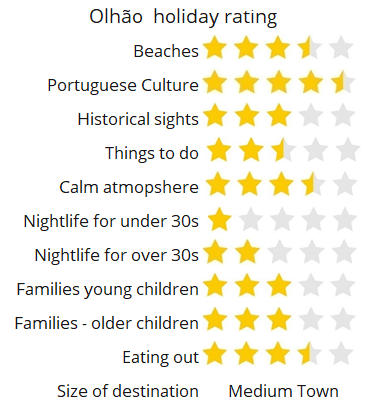
Olhão beaches
The beaches of the Olhão region are found on the southern side of the two sandbar islands, the Ilha da Culatra and Ilha da Armona. These two islands can be reached by the ferry services that depart from Olhão harbour.
The beaches extend along the entire length of the two islands, and offer over 10km of golden sands and calm seawaters. As the beaches are protected by the Parque Natural da Ria Formosa, they have a pristine setting, surrounded by sand dunes and beach vegetation.
The beaches of Culatra and Armona tend to be very quiet, especially when compared to other beaches in the Algarve. On the Ilha da Culatra is a traditional fishing village, while Ilha da Armona is a tiny village filled with holiday homes.
If you are on holiday in or near Olhão, these beaches will not disappoint.
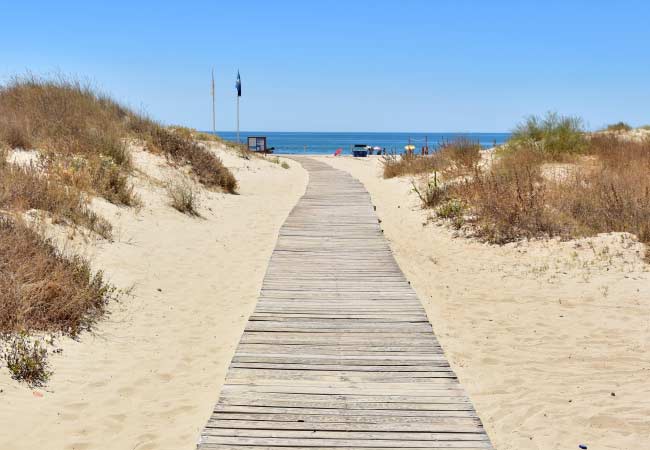
There are quiet section of beach on Ilha da Armona
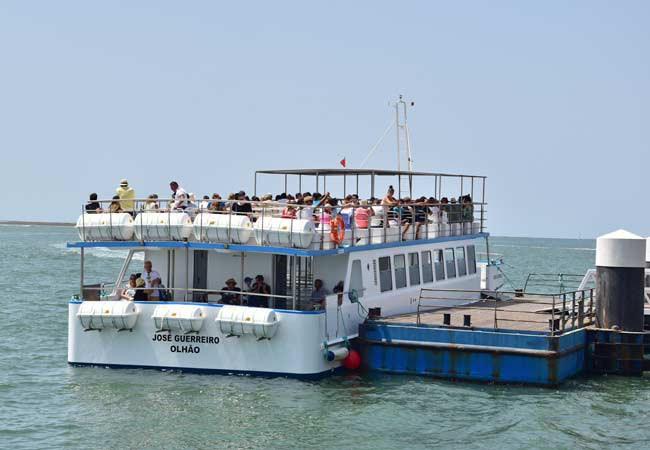
It is a 20-minute ferry ride from Olhão to the Ilha da Armona
Sights of Olhão
Olhão market
Olhão market is the vibrant heart of Olhão, and is divided between two neo- Arabic red brick buildings. The eastern covered market houses the largest fish market in the Algarve, and is packed with stalls selling fresh fish from the previous night’s catch.
Within the western building is a fresh produce market, and the varied stalls sell locally grown fruit and vegetables, flowers, breads and regional handicrafts. Surround both markets are a selection of cafes and bars.
The market is open Monday to Saturday (closed Sunday). On Saturdays, there is an additional market that fills the stretches around the covered market. Further details can be seen on the market’s website: mercadosdeolhao.pt
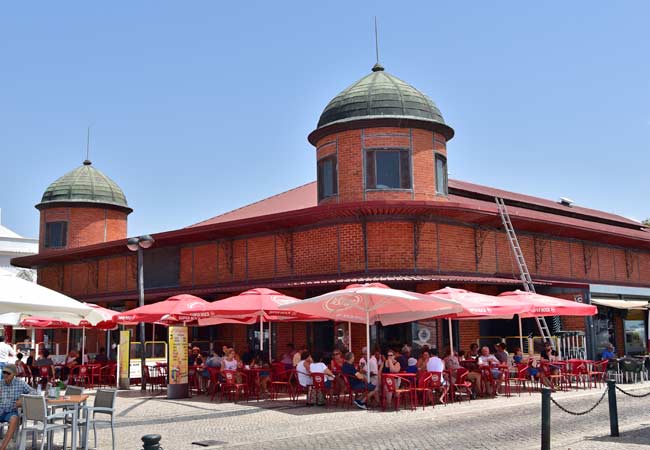
The covered market building was constructed in 1915 and celebrates the Moorish history of the region
The Bom Sucesso boat
Moored at Olhão harbour is a replica of the “Bom Sucesso” fishing boat. This small boat and seventeen fearless fishermen managed to navigate from Portugal to Brazil, in 1808, using only the stars and a rudimental map.
The fishermen made this perilous voyage to Brazil in order to send a message to the exiled king João VI, about the defeat of Napoleon’s army in the Algarve. The tiny boat of just 20m in length, which was designed for sardine fishing, managed to sail a journey of over 5,500km.
This heroic act was rewarded with Olhão being given the status of a town, freeing it from the rivalry between Faro and Tavira. The replica of the Bom Sucesso is open to the public and free to enter.
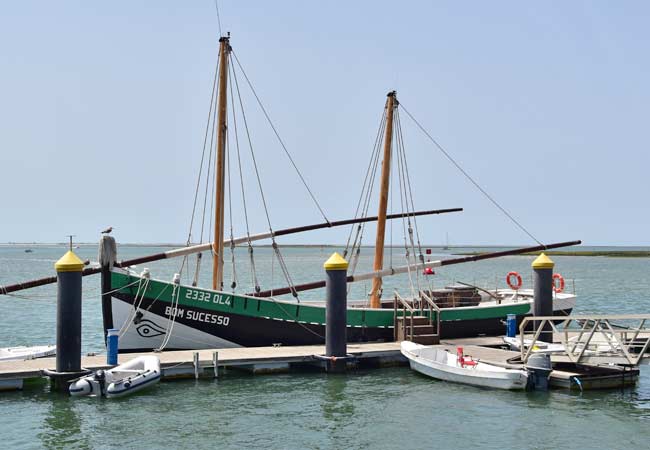
The replica of the Bom Sucesso fishing boat
The cubist houses
The fisherman’s quarter (the Bairro dos Pescadores) is warren of narrow cobbled alleys and whitewashed houses.
The houses of this area were constructed in a cube shape, with one or two stories, and flat terraced roofs. The roof terraces and flat roofs provided an unimpeded sight of the harbour and allowed the fishermen’s wives to watch for the safe return of their husbands. The design was inspired by Moroccan architecture and are referred to as “cubist” houses.
The fishing heritage of Olhão has been captured in a series of beautiful wall murals that line the old canning factory, on the Rua da Fábrica Velha.
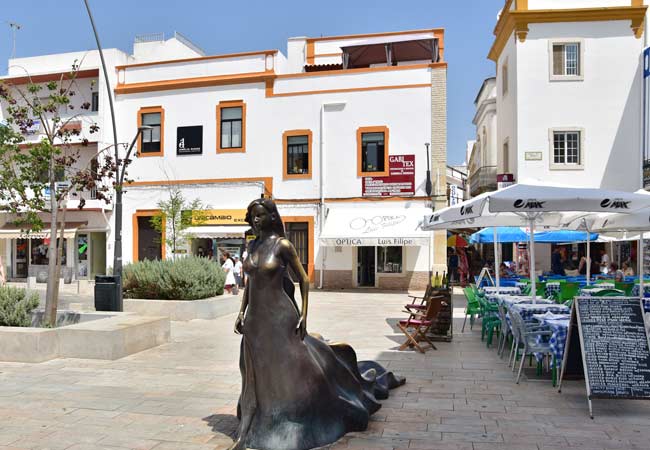
The cube shaped houses in the fishing district
The Igreja Matriz de Nossa Senhora do Rosário
The Igreja Matriz de Nossa Senhora do Rosário is a late 17th-century Rococo styled church that stands at the centre of Olhão. The church’s construction was funded by donations from the fishermen and their families. The bell tower is open to the public (€1.00 admission) and provides wonderful views over central Olhão.
To the rear of the church is the Capela de Nosso Senhor dos Aflitos. Historical, the families of fishermen came to this small chapel to pray for their safe return or to mourn the loss of loved ones.
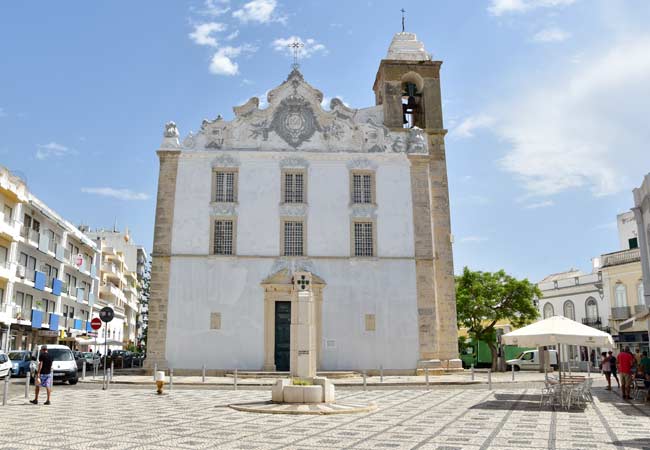
The simple white-washed façade of the Igreja Matriz de Nossa Senhora do Rosário
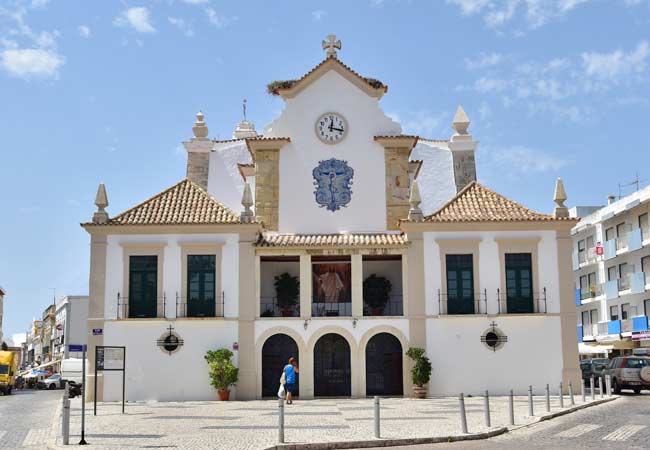
The Capela de Nosso Senhor dos Aflitos
The Parque Natural da Ria Formosa
The saltwater mudflats, tidal lagoons south of Olhão are protected by the Parque Natural da Ria Formosa.
This sandbar and saltwater lagoon ecosystem is an important habitat for birds and small aquatic life. There are numerous wading birds (such as Egrets, Ibis and Spoonbills), and it is a vital resting point for birds migrating between Europe and Africa. The calm waterways are home to one of the world’s largest concentrations of seahorse (long-snouted and short-snouted seahorse), and there are even rare Pond Turtles.
The “natural park” designation also safeguards traditional methods for fishing for shellfish and limits the extent of tourist development along the coastline. The park’s head office is in the Quinta de Marim, and from here is an enjoyable 3km route that encompasses all the different ecosystems (mudflats, pine forest and sand bars).
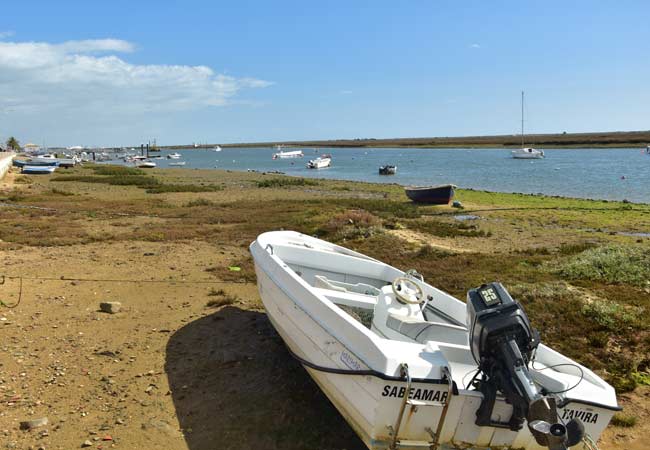
The calm waterways of the Parque Natural da Ria Formosa
Olhão, Faro or Loule?
Olhão, Faro and Loule are all popular day trips in the central Algarve region. Faro is a historic city, Loule is a market town and Olhão is a busy fishing port.
In our opinion Faro is the best destination for a day trip as it contains more and varied sights. Olhão is better than Loule as it offers both a pretty waterfront and a charming fishman district.
Related articles: Faro guide – Loule guide
Our most popular guides to the Eastern Algarve
Expert Insight: These guides are curated by Philip Giddings, a travel writer with over 25 years of local experience in Portugal. Since 2008, Phil has focused on providing verified, on-the-ground advice for the Algarve region, supported by deep cultural ties through his Portuguese family. Read the full story here.
Algarve-South-Portugal.com, with over 200 pages of holiday guides, if it's not here, it's probably not in the Algarve


















